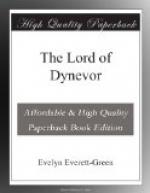“Ay, mother, I understand it well; and though there is something in the thought that stirs my blood and sets it coursing through my veins in indignation — for I see not by what right the English king lays claim to our fair lands — still I know that conquest gives to the conqueror a right, and that if he chose to march against us with his armies, he might well find us too much weakened by our petty feuds to resist his strong veterans. And the English are not all bad. I have learned that these many days whilst our guests have been with us. I have thought at times that they would be true friends and allies, and that we might do well to copy them in many ways. In truth, if the choice lies betwixt being rent in pieces by each other and giving homage to the great Edward, who can be merciful and just, I would rather choose the latter. For there must be something grand and noble about him by what our little maid says; and to pay homage is no such hard thing. Why, does not he himself pay homage to the King of France for the lands he holds in his kingdom?”
A look of relief crossed the face of the mother as she heard these words from her first-born son. She took his hand in hers and said earnestly:
“Wendot, I am glad to hear thee speak thus, for thou art the heir of Dynevor, and upon thee much may fall some day. Thou knowest what thy brothers are — I speak of Llewelyn and Howel. I cannot but fear for them — unless, indeed, the rapacious greed I sometimes see in Llewelyn proves stronger than his fierce hatred to the English, and he prefers to do homage for his lands rather than lose them. But thou art the head of the family, and the chief power will rest with thee when thy father is gone. I counsel thee, if the time comes when thou must make thy choice, be not led away by blind hatred of the English. They may prove less cruel foes than thine own countrymen are to one another. If Wales may not be united under one native king, let her think well ere she rejects the grace held out to all who will yield fealty to the English monarch. That is what I wished to say to thee. Remember that the English are not always cruel, always rapacious. There are generous, noble, honourable men amongst them, of whom I am sure our guest is one.”
“Ay, he has a grand face,” said Wendot. “A face one can both love and trust. And all that the little one tells me of the king and his family inclines my heart towards him and his. I will remember what you have said, mother, and will ponder your words. Methinks it is no lovely thing to hate as Llewelyn and Howel hate; it makes men act rather as fiends than as honourable soldiers should.”
The conversation ended there, and was not renewed; but the very next day Lord Montacute sought Wendot’s room, when the lad was lying alone, wearying somewhat of his own company, and the light sprang into his eyes as he saw the guest approach, for in his own boyish way he had a great admiration for this man.




